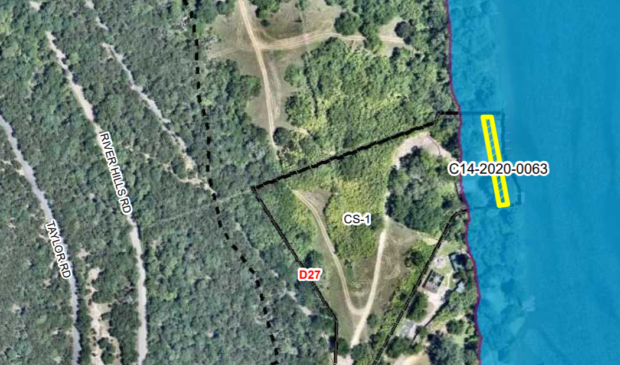Pier on Lake Austin rezoning takes next step
Tuesday, December 15, 2020 by
Jo Clifton The new owners of the once popular Pier restaurant on Lake Austin will have to wait at least until January to get the zoning change they need to repair 20 boat slips on the marina at 1703 River Hills Road. City Council voted unanimously on a motion by Council Member Alison Alter to rezone just 2,230 square feet on the shoreline from Commercial-Liquor Sales (CS-1) to Commercial Recreation (CR). However, Council members approved the ordinance on second reading only, so it will come back again for a third reading vote.
Although the owner, Tires Made Easy Inc., has not indicated it wants to sell gasoline from the dock, Alter’s motion specifically excluded service stations as a permitted use on the property, as requested by representatives of Travis County Water Control and Improvement District 20.
Under the city’s quirky Land Development Code, CR zoning is the only category that allows marinas. The property owners are prohibited from repairing their boat slips until they obtain the appropriate zoning. The remainder of the property will continue its CS-1 category.
In the first hearing on the matter, Nikelle Meade of Husch Blackwell, representing the applicant, said her clients had no plans to sell gasoline at the marina. However, she declined to agree to a prohibition on gasoline sales. Alter did not ask for Meade’s opinion on the matter before making her motion last week.
Alter and the rest of Council heard from several representatives of the water district, who objected to the rezoning because of the marina’s proximity to the district’s raw water intake pumps. Those pumps are within 1,000 feet of the Pier property and state regulations prohibit such intakes from being located so close to public marinas. The major concern is gasoline polluting the water supply.
Meade has pointed out that the Pier restaurant and marina began operations in 1958, many years before the WCID put in its water intake pumps. As she noted in an email about the matter, “What the district is failing to reveal is that they asked the state of Texas for a variance to be able to locate the intake structure in its current location. And, they did so when not only the boat slips but also the Pier restaurant were open to the public and in full operation and, in fact, more intense than what is proposed today.”
Alter asked Chris Herrington, the city’s environmental officer, for his opinion about gasoline sales at the location. He responded, “I do appreciate their concerns about hydrocarbons in the lake, but we do have many, many boats and many, many boats being filled by individual dock owners on the lake. So if we were really concerned about hydrocarbons, we would probably talk about prohibiting gas-powered motorboats on the lake – which would go over as well as a lead balloon in Lake Austin, but help our shoreline erosion issues.”
He told Council he agreed with Meade, who stated that in order to offer fueling facilities on the dock, the property owner would have to receive at least one land use commission variance, and possibly two.
He added, “So it is difficult for environmental staff to comment on that since we haven’t seen a design. There is no application currently in review that includes those fueling facilities I am aware of. … It would necessitate again at least one, potentially two, variances” to be approved by the Zoning and Platting Commission.
Herrington concluded, “In order to recommend such variances, staff would have to conclude that the fueling facilities provided equal or better water quality and there was not a significant probability of harmful environmental consequences. So it would require a rigorous review and design process if they did elect at site plan to add fueling facilities.”
Council Member Jimmy Flannigan agreed to vote for the zoning change on second reading, but wanted more time to consider the matter before third reading. “I feel like this is one of those scenarios where we are solving” problems caused by a broken Land Development Code, he said. “In this case it looks like we are split zoning a single property to try to get us partly where we want to go.”
The Austin Monitor’s work is made possible by donations from the community. Though our reporting covers donors from time to time, we are careful to keep business and editorial efforts separate while maintaining transparency. A complete list of donors is available here, and our code of ethics is explained here.
You're a community leader
And we’re honored you look to us for serious, in-depth news. You know a strong community needs local and dedicated watchdog reporting. We’re here for you and that won’t change. Now will you take the powerful next step and support our nonprofit news organization?











